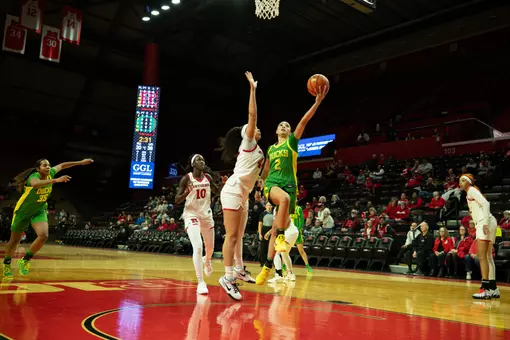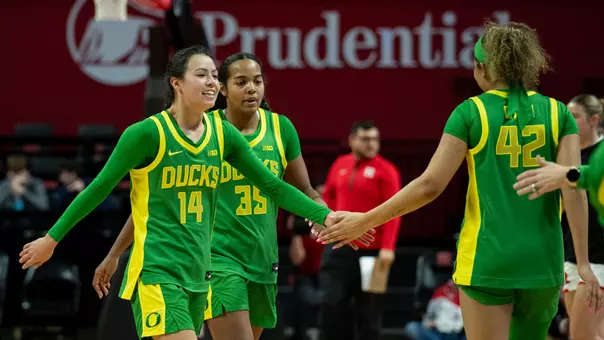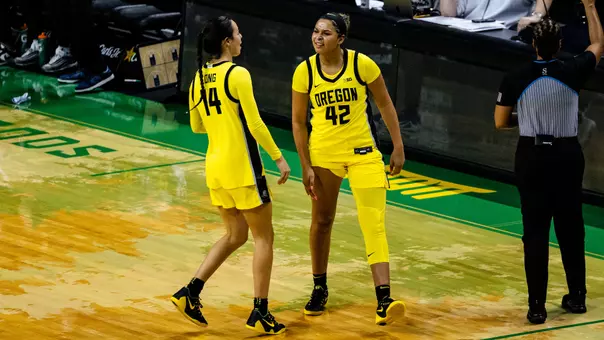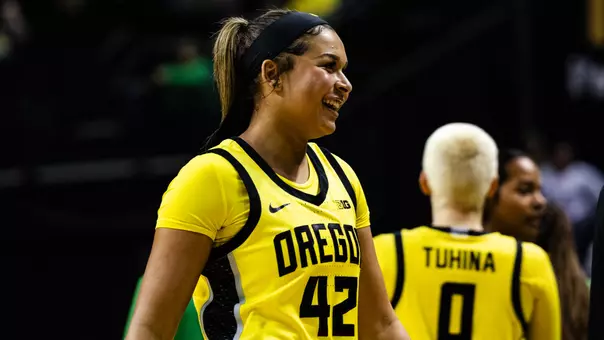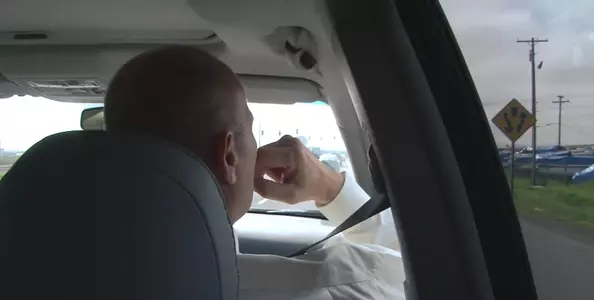
Sweet 16's: On The Hunt For A Program-Defining Recruiting Class
11/26/15 | Women's Basketball, @GoDucksMoseley
By Rob Moseley
Editor, GoDucks.com
By the middle of the 2014-15 season, it was clear that the rebuild of Oregon women's basketball under new coach Kelly Graves and staff would not be immediate.
After failing to finish above .500 in six of the previous seven seasons, the Ducks went 13-17 in 2014-15. And at the end of each day, spent working feverishly to turn the program around, enduring more defeats than victory, Graves went home to an empty house, to boot.
Graves was hired at Oregon in April 2014, after 14 years at Gonzaga. To enable their son Jackson to finish high school in Spokane, Wash., Graves' wife, Mary, didn't move to Eugene until August 2015. Graves is a coach, yes, but also a husband and father, who missed his family.
“Last year was a tough year,” Graves said. “But the thought of our recruits – I told them, 'You guys made this season bearable.' Because I knew what was coming.”
From the time they were hired in the spring of 2014 – too late to devote full attention to the signing class of 2015 – Graves and his new staff had turned their focus to high school seniors set to graduate in 2016. Graves and his assistants had identified 10 to 12 players to pursue, for six or seven spots in the class.
It was a remarkably big class, and they needed to have a remarkably good success rate in order to make it the program-defining group they envisioned.
Early in the cycle, the staff had a decision to make. A recent NCAA rule change allowed coaches to visit recruits in their homes not only in the spring of their junior year, but the previous fall as well. Many schools, still coming to terms with the rule, stuck to planning home visits with 2016 recruits in the spring of 2015, as usual.
But the rule change allowed visits in the fall of 2014 as well. For a new staff looking to make a dramatic, aggressive impression – with recruits being pursued by programs boasting much better track records of recent success – the rule change provided an opening.
Graves' temporary bachelor status made it even easier to exploit that opening. Few head coaches across the nation devote as much energy to recruiting as the bearish, charismatic Graves, according to assistant coach Mark Campbell.
“People just love him,” Campbell said. “In the home visit, he's phenomenal. He has a gift for that. And he knows it.” The Ducks intended to maximize that advantage in the fall of 2014.
Among the first areas the UO staff travelled to for home visits was Southern California. Graves and assistant Nicole Powell made a series of visits together, sometimes to three or four houses a day.
That meant countless meals with players' families. “It's a killer,” Graves said with a playful groan. “I put on so much weight.” And, not wanting to wear the same suit twice, Graves would sometimes find himself changing clothes in the passenger seat of a car, as Powell barreled down a Los Angeles freeway.
The staff was invigorated by the chance to rebuild the Oregon women's basketball program. But it was aware, too, of its narrow margin for error, targeting a relatively low ratio of players to open scholarships.
“We hadn't proven anything,” Powell said. “We'd been talking about our vision, but it hadn't come to fruition yet. We're talking about the things we're going to do with this great group – and no one has committed yet.”
That changed in the fall of 2014. Earlier that summer, in one of its first moves to identify talent for the 2016 recruiting class, Graves offered an “Elite Camp” in Eugene for high school players. Among the players who showed up was an athletic wing named Jayde Woods.
A consensus top-100 player in the nation, Woods began her prep career at storied Mater Dei High. She transferred to Windward School of Los Angeles, and played for Vanessa Nygaard, like Powell a Stanford graduate.
When Powell walked out of Woods' house following a home visit later that fall, “I didn't have a read,” she recalled. “I was just like, I don't know.” But shortly thereafter, Woods made another unofficial visit to Eugene. During the trip, she became the first recruit to verbally commit to play at Oregon beginning in 2016.
“She knew what she wanted, she believed in us and she wasn't afraid to say yes,” Powell said. “At that age, it's hard for some players to make these decisions. That gives confidence to other recruits. It builds trust, that we're doing what we said we would do. I think it signaled to the other kids and their families, OK, this is for real.”
The commitment was validation for the new UO staff – the vision they were selling could be a reality. They just needed the first domino to fall. With Woods' commitment, the class began to take shape.
On the same hectic weekend of home visits to Southern California, the Ducks also dropped in on another top-rated player, Sierra Campisano. Graves considered the 6-foot-3 forward from Torrey Pines to be “the most skilled big kid in the country, hands down.” ESPN rated her its No. 14 player in the nation among the class of 2016.
Campisano also had attended one of Oregon's summer camps in 2014. But her ties to the staff went back further. In his previous job, at Oregon State, Campbell had sent out a questionnaire to prospective recruits, Campisano among them. Her mother decided to see how serious the gesture was – she called Campbell and wanted to know what he knew of Campisano.
Fortune smiled upon the energetic assistant coach. He might not have been able to break down every one of the dozens of players who received the questionnaire. “But I knew Sierra inside and out,” he said.
Coincidentally, it was after a game between Oregon and Oregon State that Campisano committed to the Ducks. Oregon had just lost by 29 points in a January 2015 game, but Campisano, demonstrating the kind of fortitude the UO staff sought for its rebuilding process, committed after attending the game on an unofficial visit. “OK,” Graves started to believe, “we've got something special going here.”
The third 2016 commitment was from another top-100 forward on the West Coast, Mallory McGwire of Reno. McGwire played with the elite Cal Stars club, which won the Nike EYBL national championship in 2015. The club went 53-1 this past summer, and Campbell was in the bleachers for every single one of those games, unable to so much as talk to McGwire but signaling to her by his presence Oregon's interest.
McGwire's recruitment presented its own unique challenge. Her father, Dan, played quarterback at San Diego State and later in the NFL. Her uncle, Mark, played at USC before bashing his way to Major League Baseball home run records.
This was a family that knew a little something about the college recruiting process. “The coaches who don't know what they're doing are going to get weeded out quickly,” Campbell said. “Because you ain't tricking that family.”
The Ducks didn't rely on any tricks. McGwire committed, and Graves' optimism continued to soar. “After the first three, we're already feeling great,” Graves said. “We have an elite center, an elite forward and an elite guard.”
At some point during the cycle, as the Ducks sought to identify a versatile combo guard for the class, Campbell followed up on a random email he received from Australia. The father of Morgan Yaeger had sent email inquiries to dozens of U.S. college coaches. Campbell – who coached two future NBA players from Australia, Matthew Dellavedova and Patty Mills, while a men's assistant at Saint Mary's – was one of just two who responded.
As it so happened, one of Graves' former players at Gonzaga, Kelly Bowen, was playing professionally in Australia, on a team that also included Yaeger (who retained her amateur status with the NCAA by only having her travel expenses covered). Bowen's scouting report on Yaeger to Graves: “She can ----ing ball.”
That was pretty much all he needed to hear. A scholarship offer was extended, and Yaeger, via video conferencing, made her verbal commitment.
At this point, Oregon's class already included the 6-3 Campisano and 6-5 McGwire. But Graves desires nothing so much as length in recruiting. And tucked away at West Seattle High was Lydia Giomi – all 6-6 of her.
The granddaughter of a former UO football player, Peter King, and daughter of Mike Giomi, who played collegiately for Bobby Knight at Indiana and Jim Valvano at North Carolina State, Lydia Giomi was a raw but athletic prospect – “as fast as any guard,” Graves said, calling to mind a new addition to the UO men's program, Chris Boucher.
Some other programs were tentative in their pursuit of Giomi. But given its needs for the 2016 class, Oregon couldn't afford to be tentative with anyone. The Ducks made all their recruits top priorities. It paid off when Giomi, ESPN's No. 15 post in the country for 2016, committed to their class this spring.
This is not to suggest the Ducks batted 1.000 with their class of 2016. Three or four players were recruited as hard as any in the class, and chose to sign elsewhere.
“The true art of recruiting is being able to evaluate where you're at in that recruit's mind – where you truly stand,” Campbell said. “You have to have a great awareness of that. Being able to move on when you need to move on. And when you know you're in there, then you fight and do whatever you need to do.”
Like, for example, going so far as to miss a game for the sake of a recruit. Which Campbell did, on Feb. 6 of last season, when the Ducks played at Washington State. He was in Alaska at the time, watching a uniquely gifted player named Ruthy Hebard. “That's the first time,” Campbell said, “that I've ever missed a game. In my nine years of D-I coaching.”
The sacrifice paid off this past summer, when Hebard committed to the Ducks. She was the fourth top-100 player as rated by ESPN to join the class, and the third standing at least 6-4.
The vision for Oregon women's basketball laid out by Graves and his new staff had become a reality.
If you missed it, check out Wednesday's series introduction, "The Plan," and check back Friday for the finale, "The Future."


